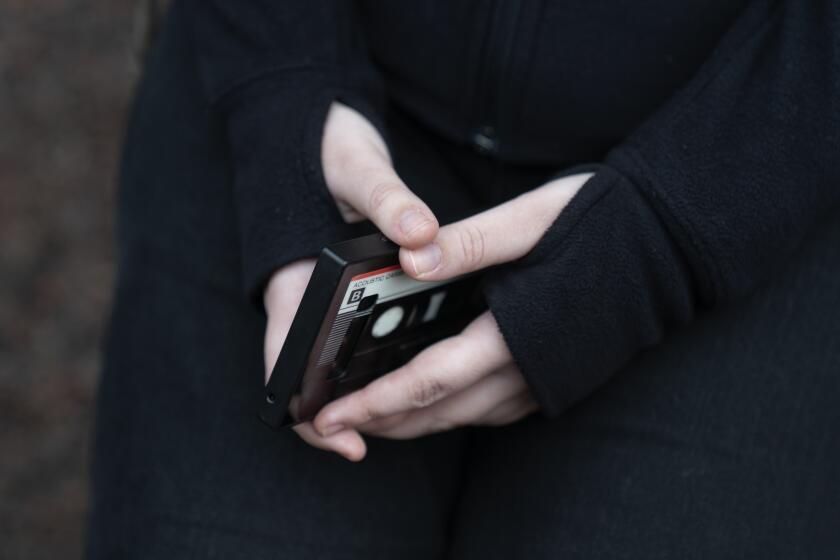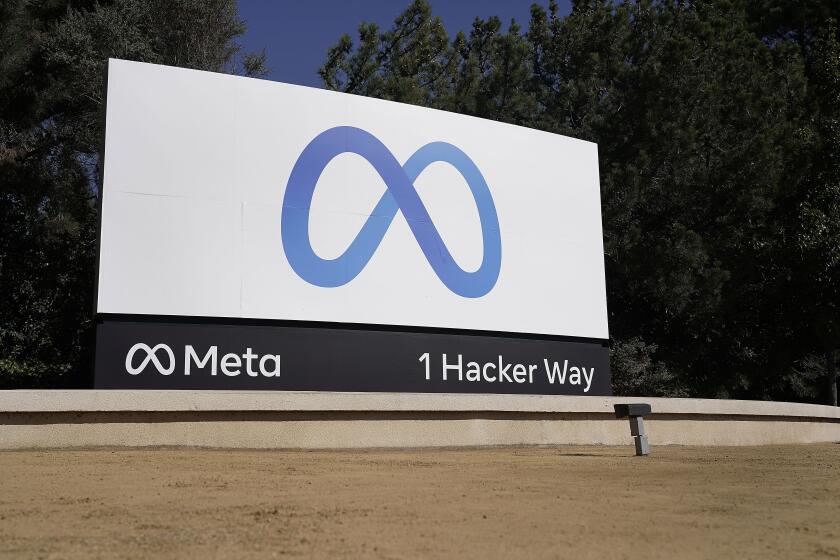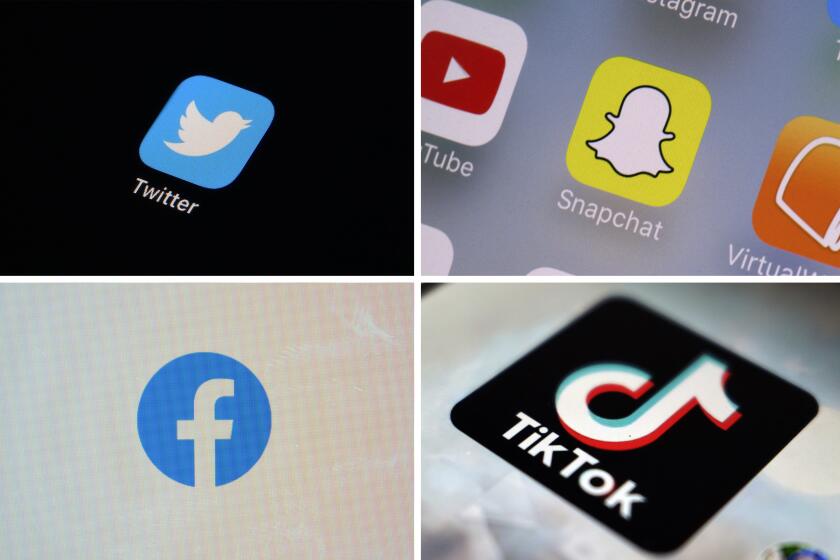Teens know how social media affects mental health. So they created resources to help
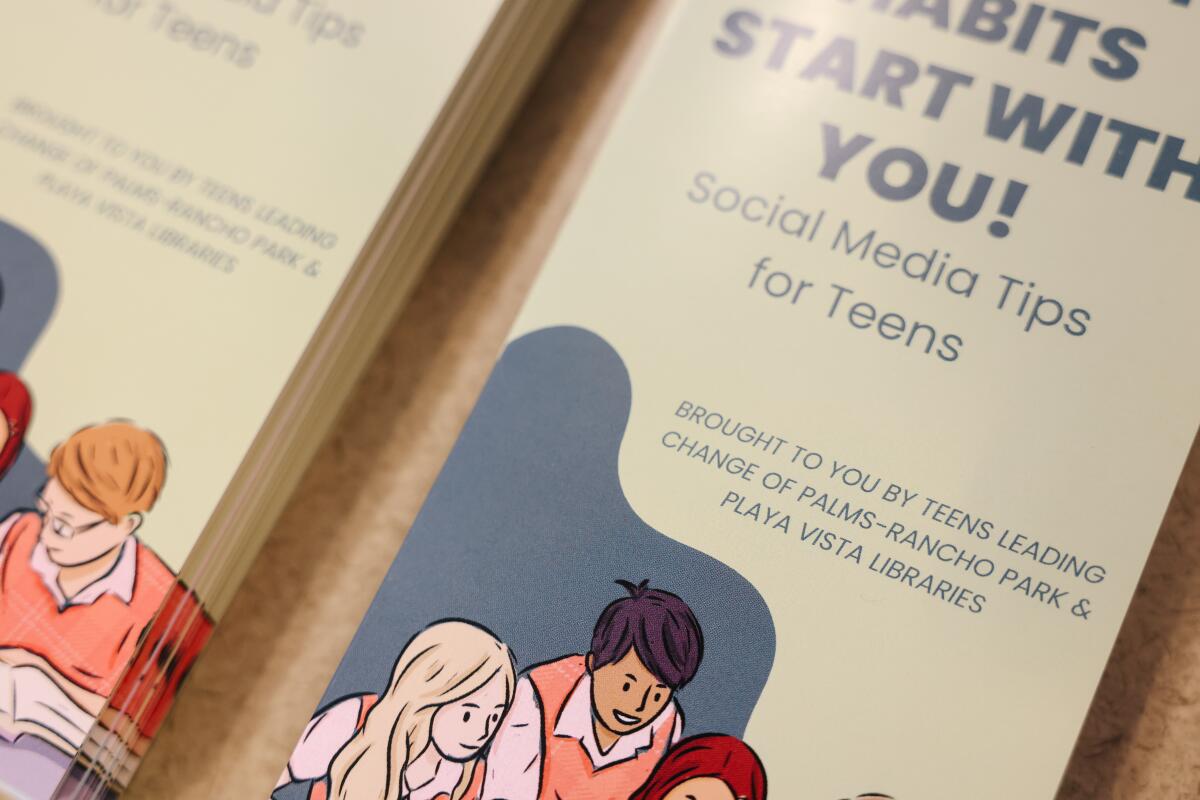
- Share via
When he was in sixth grade, Antonio Chow spent hours on his phone, watching endless videos about the latest movies and cars.
His family worried as he became increasingly distant, his face always awash in his phone’s bright screen. He stopped studying and bombed English quizzes. Before long, his grade slipped from an A to a B.
“When I was very close to a C, I knew that there was something wrong,” Antonio said. He remembers all the time he spent online and how, at the end of the day, he was left with a feeling of emptiness. “I felt like I [hadn’t] done anything.”
Antonio, 13, managed to pull away from social media addiction, and his family noticed the shift. He started playing tennis again and going for walks with his dad. He and his sister Angelina, 15, joined a group that spent the last year and a half creating videos and brochures centered on mental health and social media.
Adolescents in the group, some as young as 13, have dealt with social media addiction, body dysmorphia and cyberbullying from classmates and strangers as the platforms they frequented fed them uncensored streams of content.
This younger generation grew up with social media at their fingertips and therefore are “unknowing participants in a decades-long experiment,” U.S. Surgeon General Vivek K. Murthy said in a May advisory warning against the negative impact social media is having on the mental health of young people.
The U.S. surgeon general says there isn’t enough evidence to show that social media is safe for young people. He called on tech companies and caregivers ‘to protect kids now.’
And though Murthy acknowledged that some adolescents reported benefits from social media, there is not enough research to conclude it is “sufficiently safe” for them to use.
Teens have known this for a while, yet they feel their voices as stakeholders are often left out of the national conversation. As concern rises over the impact social media has on adolescents, legislators are enacting laws restricting adolescent access to social media as they try to rein in tech companies.
In March, Utah became the first state in the country to place limits on social media use by requiring parental permission for minors to open social media accounts in 2024. Last year, California Gov. Gavin Newsom signed into law requirements for social media companies that protect minors by defaulting to strict privacy settings.
This year, California legislators are pushing forward a bill that would audit social media platforms to ensure they are not using algorithms or features that knowingly harm children, such as fostering addiction or causing youths to develop eating disorders, and proposes allowing local and state governments to prosecute the companies for failing to correct their practices.
For teens, the conversation on mental health and social media means developing healthful habits around the platforms, which have become nearly inextricable parts of their lives. Through the Los Angeles Public Library’s Teens Leading Change initiative, a group of teenagers at the Palms-Rancho Park and Playa Vista branches have created public service announcements and brochures that offer tips on how they and their peers can maintain healthful habits online.
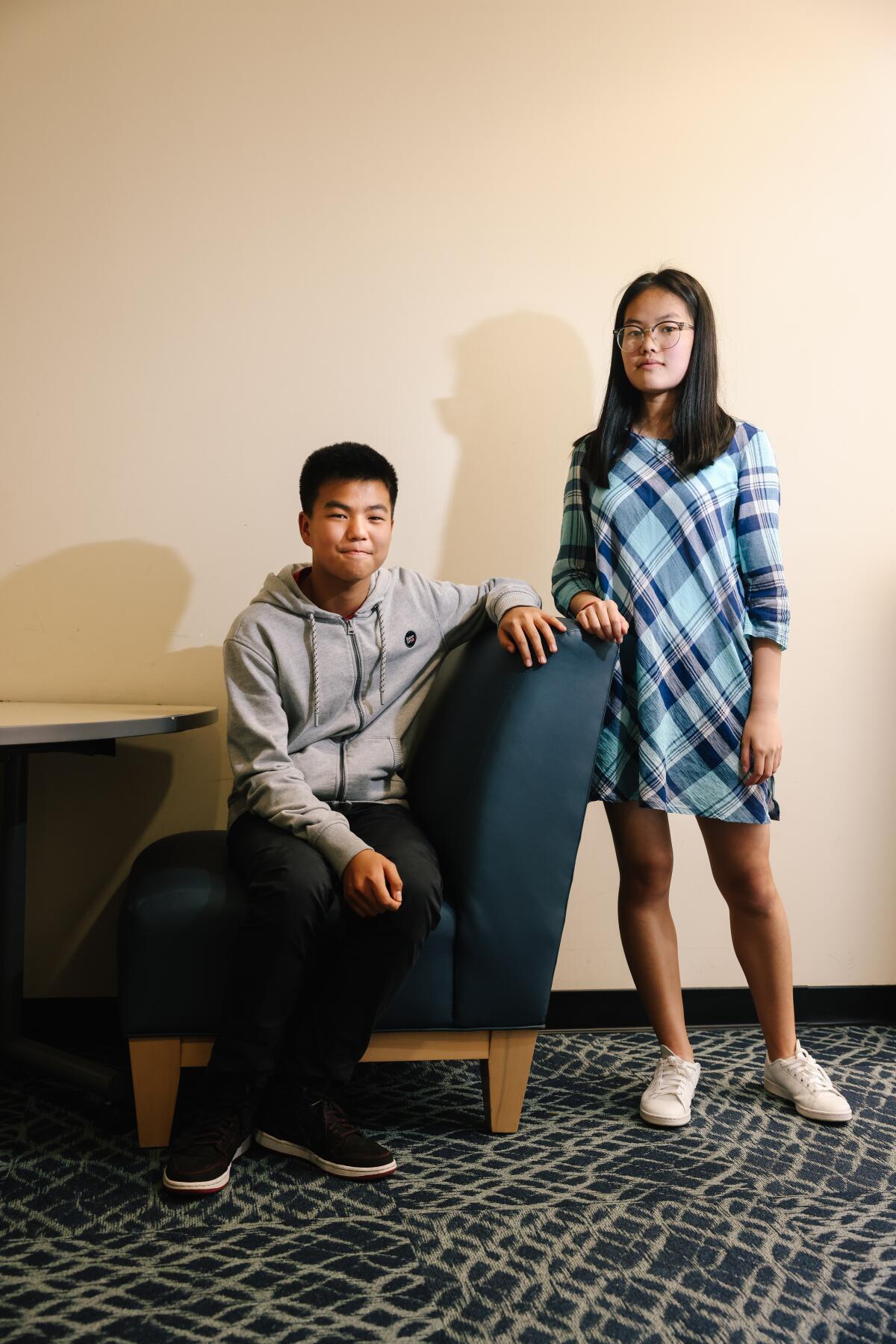
On an afternoon in May, the teens gathered at the Palms-Rancho Park Branch Library for one final meet-up before they presented their efforts to family and friends. They munched on pizza as Emily Meehan, a young adult librarian who led the group, guided them through their planned talking points.
“What’s one way to use social media in a healthy and mindful way?” Meehan prompted.
“While social media causes a lot of these body image issues and stuff, people have also been using it to counteract that bad stuff,” Shira Cohen, 14, chimed in.
“Yes, body positivity,” Meehan said, nodding. She continued with another question: “What is something important that you have learned during your time with this project?”
“When you’re on social media, making sure you’re constantly on guard,” Angelina said. “Not everything you see is real.”
A new law in California will require companies that provide online services to protect children’s privacy
For many of the teens, their own experiences shaped their desire to discuss social media’s effect on their lives. In middle school, Shira joined Pinterest and Instagram as a way to inspire her artwork. But her feeds began showing her photos about fashion and women and girls who had “perfect bodies.”
She began comparing herself to those models and felt her body didn’t match what she saw online. So she began hiding herself in baggy T-shirts and pants.
“I just didn’t feel good in my own skin,” Shira said. But once she realized those “perfect bodies” were a result of dieting and photo editing, she quit all social media platforms. “ I didn’t want to put myself through all this comparing, and I wanted to feel good about myself.”
Angelina, who watched her brother struggle with social media addiction, also saw one of her close friends develop an eating disorder and compare herself to models she saw online, she said. Her friend stopped eating during school lunch, she said.
The shift troubled Angelina. She wrote the script for one of their public service announcements focusing on body dysmorphia, a disorder in which people obsess over flaws in their appearances that, often, only they can see. The PSA is titled “perfectly imperfect.”
Her message to her peers: “You don’t have to try to compare yourself to something that is not really realistic.”
Studies point to social media bolstering body dissatisfaction, including eating disorder behaviors and low self-esteem, particularly among girls, according to Murthy’s advisory. Overall, 46% of adolescents between the ages of 13 and 17 said social media made them feel worse about their bodies.
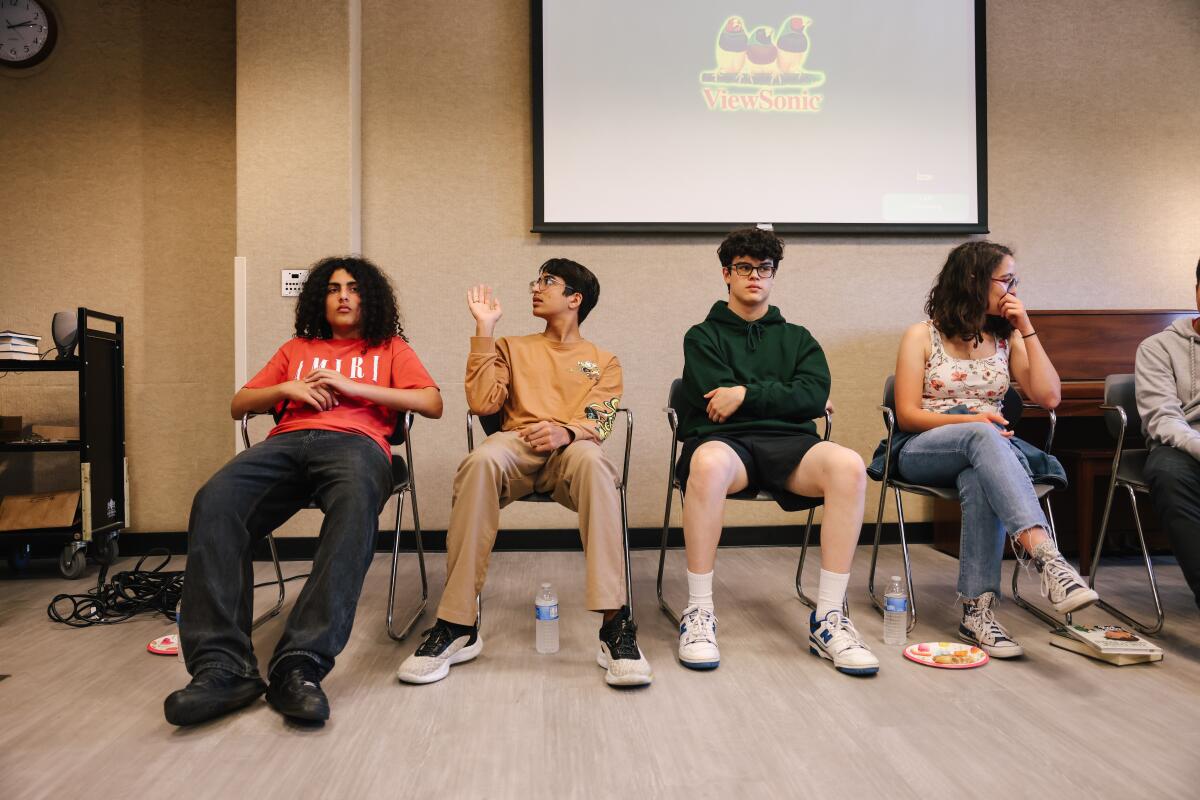
Zane Herndon was in eighth grade at Palms Middle at the time of the project. He said that when he was in sixth grade and classes were conducted over Zoom, classmates found his TikTok accounts and made fun of his appearance.
“They said I was an ugly bum,” Zane said. It made him feel awful; he cried for a few days after it happened, but the hateful comments continued. He blocked the accounts and eventually told his mom, who took his phone away.
“She just told me to not use my phone so much and these things happen,” he said.
Adam Talasazan, 15, a rising sophomore at Palisades Charter High School, also dealt with harassment from people he met through online video games. Like Zane, Adam had no choice but to rely on the Internet to find friends while stuck at home during the COVID-19 pandemic.
Adam said he became close with people he met through online games. But eventually they began talking about him negatively. Eventually they began digging into his personal life. So he blocked them. Still, they managed to find his Snapchat account and harassed him over photos he posted of himself, which made him feel bad about his body. He was in seventh grade at the time.
“[My friends] helped me get through it,” he said. “But at the time, it was very hard.”
They are not alone — about two-thirds of adolescents are “often” or “sometimes” exposed to hate content, and studies linked cyberbullying to depression among children and teens, according to the U.S. surgeon general’s report.
On a Saturday afternoon in June, the group presented their project and debuted their PSAs to a small group of proud parents, grandparents and friends who had gathered in a conference room at the Palms library.
They offered advice on navigating social media responsibly: don’t scroll before going to bed, set a limit on social media use, practice gratitude and know when to reach out for help.
The first video played out a familiar school scene: a young girl is scrolling through her phone when she begins receiving hateful texts. “Ugly,” the texts taunted. “Dumb.” The girl’s bully is eventually revealed to be a former soccer teammate who remained upset about the girl’s mistake that cost them a game.
The second video featured a trio of friends hanging out. One begins to obsessively take selfies. The two others try to tell their selfie-obsessed classmate that she is beautiful no matter what. Through arguments and hard conversations, the friends reunite, the selfies abandoned.
The videos, written, directed and acted out by the teens, feature links and phone numbers to organizations that help individuals dealing with thoughts of self-harm and bullying.
Jerry Chow said that, as a parent, it’s been difficult to navigate how and whether to limit his children’s use of social media because it has become so intertwined with their schoolwork.
Dr. Vivek Murthy, the U.S. surgeon general, has warned about social media’s effect on the mental health of children and adolescents. He offers guidelines for parents.
“Even for parents, we don’t know what to do. Do we monitor them or should we deny them social media?” he asked after watching his children present their project. He was glad to see them take the lead in the conversation about social media and understanding its effects, something he didn’t have to deal with while growing up.
Afterward, they handed out stress balls and stickers that read “stay happy and healthy when using social media.”
Meehan, the librarian, said the teens’ voices are important in the broader conversation as adults aim to regulate social media companies.
“I feel like, as adults, we constantly see teens and say … ‘They’ve grown up with it, they’re always gonna be addicted and it’s going to [be a] detriment [to] their lives’,” Meehan said.
But the project proved they are “seeing how social media affects their lives and their peers’ lives, and they aren’t going to have that. They want to do something about it.”
More to Read
Sign up for Essential California
The most important California stories and recommendations in your inbox every morning.
You may occasionally receive promotional content from the Los Angeles Times.
